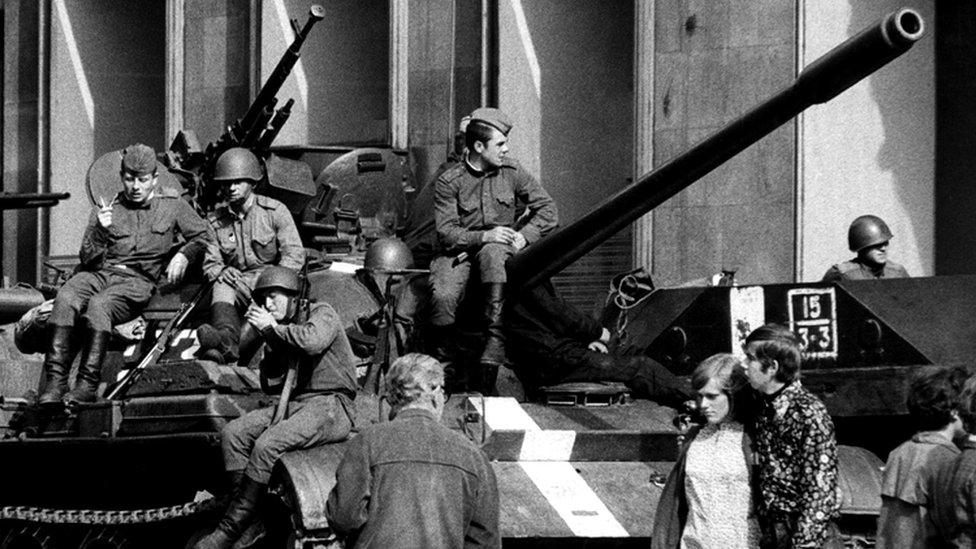How crowds toppled communism's house of cards in 1989
- Published
Moment Romanian dictator Ceausescu's execution was announced
When the Soviet empire in Eastern Europe collapsed in the final months of 1989, I was sent to report on each of the revolutions that took place in the space of only six weeks: the fall of the Berlin Wall, the peaceful revolution in Czechoslovakia, and the violent one in Romania.
On 1 October 1989, no-one dreamed that by Christmas the Berlin Wall would have fallen, Czechoslovakia would be free, and Romania's despot Nicolae Ceausescu overthrown.
Most people assumed that the Soviet bloc would last forever. Yet in fact it was a house of cards - only the fear of Russian intervention kept it standing.
In 1953, riots in East Germany had been brutally crushed. In 1956, when Hungary tried to break away, Soviet tanks destroyed the revolution. In 1968, the Czechoslovak leader Alexander Dubcek introduced "Socialism with a human face", and Moscow sent in the tanks again.
But by October 1989, the threat of force had disappeared. When demonstrators came out on the streets of East Germany, the USSR's reformist leader Mikhail Gorbachev warned the regime in East Berlin not to open fire.
Yet the collapse of the Soviet bloc happened by accident.

Fall of the Soviet empire
On the evening of 9 November 1989, the East German spokesman Günther Schabowski gave his usual press conference.
The ruling Politburo was hoping to defuse the tension by offering people visas to visit West Germany - but only by means of a deliberately slow and bureaucratic process. No-one explained this to Schabowski, though. Worse, as he hurried to the press conference he managed to mislay the document detailing the plan.
Someone asked when the new system would start. Schabowski, flustered, answered: "Immediately."
West German television, which everyone in the East watched, interpreted this as meaning that the Berlin Wall would be opened that night. Huge crowds built up in the East, and the border guards let them through. The Wall, the key symbol of Soviet-bloc repression, had ceased to divide Germany.
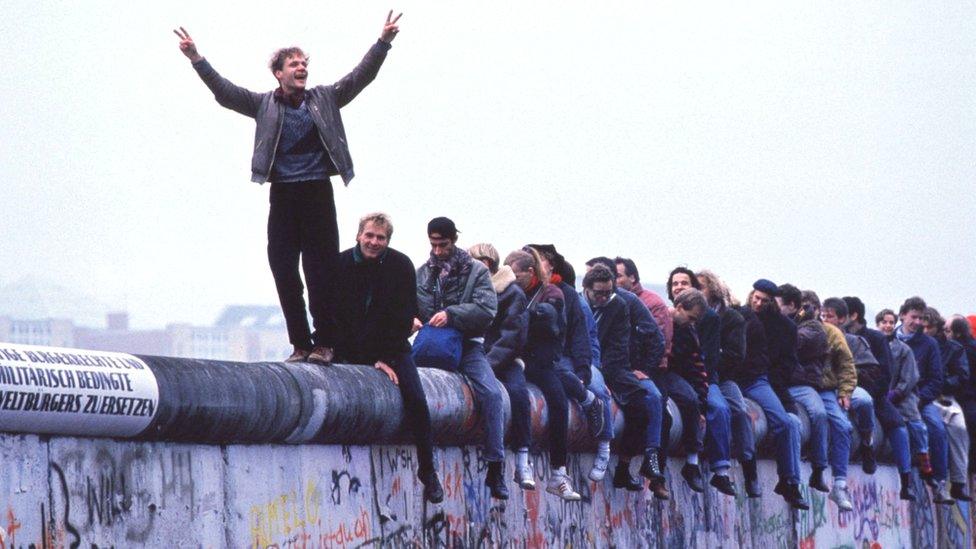
West Germans celebrate the collapse of communism atop the Berlin Wall, 12 November 1989
The next night I found myself dancing on top of it: something I'd never thought in my wildest dreams would happen.

Light returns to Magic Lantern
In neighbouring Czechoslovakia, the opposition was led by the intellectuals of Charter 77. They had been brutally repressed, but their leader, playwright Vaclav Havel, insisted that they should behave like a government in waiting, with detailed proposals for reforming the economy and the law.
Only eight days after the Berlin Wall came down, on 17 November, a series of protest demonstrations began in Prague's Wenceslas Square.
The moment I landed, on 19 November, I headed directly for the square. I could see that most older people, who had endured the heartbreak of the 1968 invasion, were trudging home, while young people, who did not remember 1968, were pushing and shoving excitedly to get to the demonstration.
Slowly, over the following days, older people joined in too; and by 24 November the square was full.
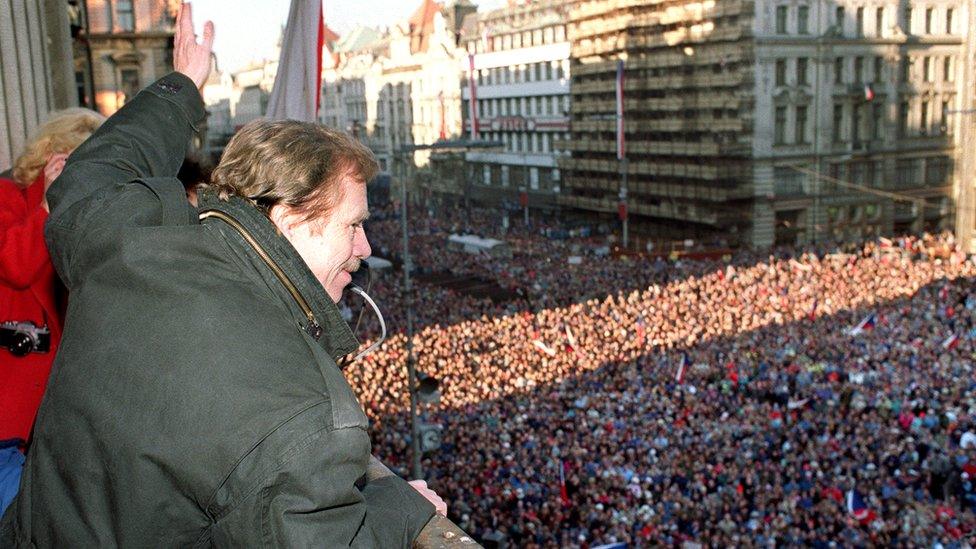
Vaclav Havel waves to a huge crowd on Prague's Wenceslas Square, 10 December 1989
That evening Alexander Dubcek, the leader in 1968 who had been under house arrest ever since, came to the Melantrich building overlooking the square.
I was standing beside Vaclav Havel as he greeted him and ushered him onto the balcony overlooking the vast crowd, as tenderly as a son with an elderly father.
The crowd roared with joy. Dubcek's voice trembled at first, but grew stronger: "The light was here before. We must act now as though the light has come again."
Below us, people were weeping openly.
Later that night, at Charter 77's headquarters - the Magic Lantern Theatre - I watched as Dubcek and Havel and the others sat on stage. Their spokesman, Jan Urban, came hurrying on with a bottle of champagne and announced that the Communist regime had resigned. The revolution was over - and it had been entirely peaceful.

Romania's dictator runs out of fuel
The hardest nut to crack was always going to be Romania, yet it only lasted a month longer.
Nicolae Ceausescu, the Communist leader, had become more and more totalitarian over the years, and his secret police, the Securitate, were ferocious.
By mid-December, people from Romania's oppressed Hungarian-speaking minority were protesting in the streets of Timisoara.
No-one dared to tell Ceausescu how serious the Timisoara rioting was, so he had no worries about calling a counter-demonstration in Bucharest on 21 December.
The Securitate bussed in factory workers to make the turnout seem bigger, and in the anonymity of the crowd some people started booing. Ceausescu froze in mid-speech, his mouth open: he had never been heckled before.
People watching the live television broadcast saw his sudden vulnerability.
When Romanians stood up to tyranny
That night the revolution broke out in earnest. The next morning, 22 December, he and his wife Elena clambered into a helicopter just as the crowd was breaking into his headquarters, and headed north.
But the pilot soon landed, claiming he had run out of fuel. The Ceausescus' bodyguards melted away. Elena, tougher than her husband, pulled out a gun and hijacked a passing car. In the end, though, they were captured.
On Christmas Day, my crew and I filmed in the Ceausescus' abandoned flat, and his housekeeper gave me the dictator's pen as a memento.
That night I was just about to go on air at the TV station, when someone announced that the couple had been executed by firing squad.
I rewrote my script at high speed, and sat back in relief. It was then that I realised I had written Ceausescu's obituary with his own pen.
- Published9 November 2019
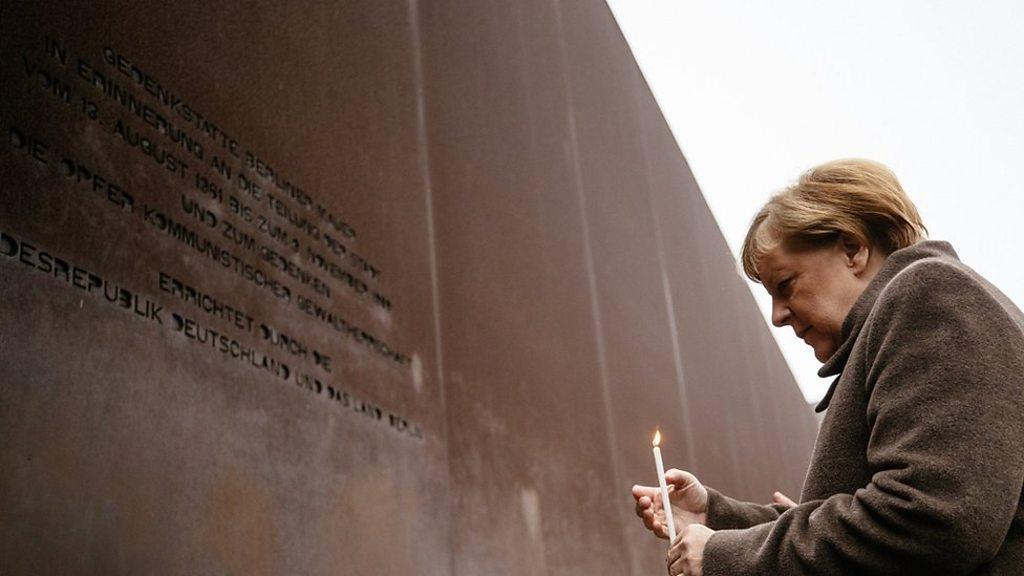
- Published19 August 2019
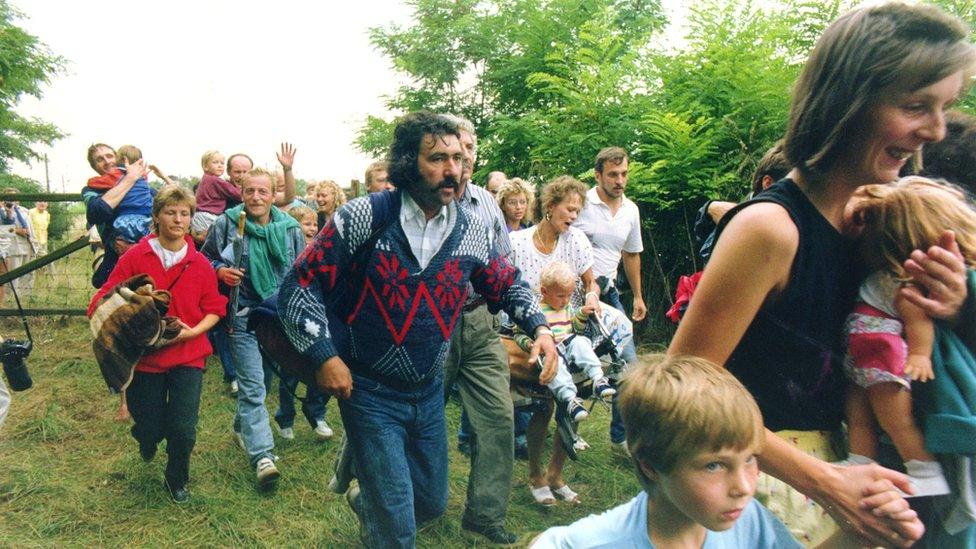
- Published21 August 2018
